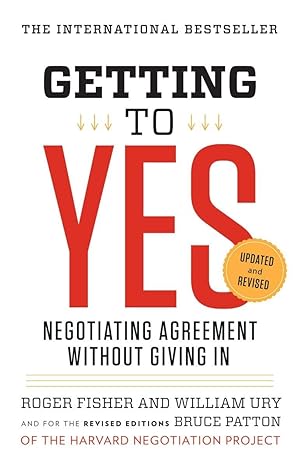“Getting to Yes: Negotiating Agreement Without Giving In” by Roger Fisher, William L. Ury, and Bruce Patton is a foundational text on principled negotiation. The book presents a systematic approach to negotiating agreements in a way that is fair, effective, and respectful.
Key concepts and strategies from the book include:
- Principled Negotiation: The authors advocate for a method of negotiation based on principles rather than positions. This approach focuses on mutual interests and fair standards, rather than personal demands or threats.
- Separate the People from the Problem: Fisher, Ury, and Patton emphasize the importance of addressing the issue at hand without letting personal relationships or emotions interfere. By separating people from the problem, negotiators can maintain focus on resolving the issue constructively.
- Focus on Interests, Not Positions: The book encourages negotiators to identify and address the underlying interests of both parties rather than sticking to fixed positions. This helps in finding common ground and creating mutually beneficial solutions.
- Generate Options for Mutual Gain: The authors suggest brainstorming multiple options and alternatives before deciding on a course of action. By exploring a range of possibilities, negotiators can find creative solutions that satisfy the interests of all parties involved.
- Use Objective Criteria: Negotiations should be based on objective standards and criteria, such as market value, expert opinions, or legal standards. This approach helps ensure that agreements are fair and justifiable, reducing the likelihood of disputes.
- BATNA (Best Alternative to a Negotiated Agreement): The book introduces the concept of BATNA, which refers to the best alternative option if the negotiation does not result in an agreement. Knowing one’s BATNA helps negotiators make informed decisions and strengthens their bargaining position.
- Communication and Relationship Building: Effective communication and building a positive relationship between negotiating parties are crucial for successful negotiations. The authors emphasize the importance of listening, empathy, and understanding the other party’s perspective.
“Getting to Yes” is highly regarded for its practical and principled approach to negotiation. It provides valuable techniques and frameworks for achieving agreements that are fair, collaborative, and sustainable, making it a valuable resource for negotiators in various contexts, from business to personal relationships.
Similar Books
“Crucial Conversations: Tools for Talking When Stakes Are High” by Kerry Patterson, Joseph Grenny, Ron McMillan, and Al Switzler
This book provides techniques for handling difficult conversations and achieving positive outcomes in high-stakes situations.
“Difficult Conversations: How to Discuss What Matters Most” by Douglas Stone, Bruce Patton, and Sheila Heen
The authors offer strategies for navigating tough conversations and resolving conflicts effectively.
“The Art of Negotiating the Best Deal” by Gerard Nierenberg
Nierenberg’s book focuses on negotiation techniques and strategies to achieve favorable outcomes for all parties involved.
“The Negotiation Book: Your Definitive Guide to Successful Negotiating” by Steve Gates
Gates provides a comprehensive guide to effective negotiation strategies and techniques.
“Never Split the Difference: Negotiating As If Your Life Depended On It” by Chris Voss
Voss, a former FBI hostage negotiator, shares tactics and strategies for negotiating successfully in high-pressure situations.
“Getting More: How You Can Negotiate to Succeed in Work and Life” by Stuart Diamond
Diamond offers practical advice on negotiating to achieve better results in various aspects of life.
“The Power of a Positive No: Save The Deal Save The Relationship and Still Say No” by William Ury
Ury explores how to say no effectively while maintaining relationships and achieving desired outcomes.
“Negotiation Genius: How to Overcome Obstacles and Achieve Brilliant Results at the Bargaining Table and Beyond” by Deepak Malhotra and Max H. Bazerman
Malhotra and Bazerman provide insights and strategies for becoming a more effective negotiator.
“Influence: The Psychology of Persuasion” by Robert B. Cialdini
Cialdini’s classic book on persuasion explores principles that can enhance negotiation and communication skills.
“Principled Negotiation: A Comprehensive Guide to Resolving Disputes” by Roger Fisher and William Ury
This book, an extension of “Getting to Yes,” offers additional insights into principled negotiation and conflict resolution.
“The Art of War” by Sun Tzu
Although not specifically about negotiation, this classic text offers strategic principles that can be applied to negotiation and conflict resolution.
“The 5 Languages of Appreciation in the Workplace: Empowering Organizations by Encouraging People” by Gary Chapman and Paul White
Chapman and White explore how understanding different ways people feel appreciated can improve communication and negotiation in the workplace.
“Radical Candor: Be a Kick-Ass Boss Without Losing Your Humanity” by Kim Scott
Scott offers advice on providing direct, honest feedback while maintaining positive relationships, which can enhance negotiation and communication.
“The Art of Communicating” by Thich Nhat Hanh
Nhat Hanh’s book focuses on mindful communication techniques that can improve negotiation and interpersonal relationships.
“Your Best Year Ever: A 5-Step Plan for Achieving Your Most Important Goals” by Michael Hyatt
Hyatt provides a structured approach to goal-setting and achieving successful outcomes, relevant to negotiations and personal achievement.
“The Assertiveness Workbook: How to Express Your Ideas and Stand Up for Yourself at Work and in Relationships” by Randy J. Paterson
Paterson’s workbook offers practical exercises for developing assertiveness, which is useful in negotiations and conflict resolution.
“The 48 Laws of Power” by Robert Greene
Greene’s book explores principles of power and influence that can be applied to negotiation and strategic interactions.
“The Art of Conversation: A Guided Tour of a Neglected Pleasure” by Catherine Blyth
Blyth offers insights into improving conversational skills, which can enhance negotiation and interpersonal effectiveness.
“How to Win Friends and Influence People” by Dale Carnegie
Carnegie’s classic book on interpersonal skills and influence provides timeless advice that can improve negotiation outcomes.
“The Six Habits of Highly Effective Negotiators” by Michael C. Donaldson
Donaldson outlines key habits and practices for successful negotiation, drawing on real-world examples and strategies.
